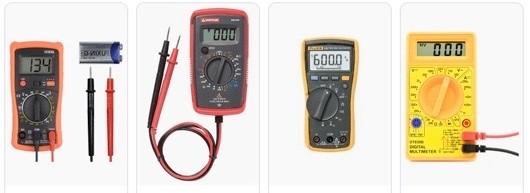So you were reading up on a project you would like to complete around the house and you came across the term for a tool called a “voltmeter” and you wanted to know what it is.
You gathered that the word “meter” indicates that something is being measured. You also figured that the thing getting measured was a “volt,” which you know has something to do with electricity.
Where does that leave us?

A screen grab of different voltmeters.
For starters, you’re right. A voltmeter measures the difference in electricity between one place and another. More precisely it measures the potential for the amount of electricity to travel the wire if a circuit is completed. That is – does the wire conduct electricity? And how much?
But many folks just use a voltmeter to see if the power is on before starting a project.
How does a voltmeter work?
A voltmeter has a main body – the meter – with a knob or a dial and a small screen. It also has two short shielded wires with exposed prongs at each end. One of these wires is red indicating a “hot” wire, and one is black indicating a “ground” or “return” wire. For most uses, the color coding isn’t important.
The voltmeter (or multimeter) helps you determine if there is a clear path across a wire of appliance.
For instance, if you have an extension cord that doesn’t seem to be working, you can touch the leads to either end to determine if there is a clear path (when the resistance on the meter goes to 0) on the expected wires, and whether there is a short, or a place where two wires touch that shouldn’t inside the cord itself.
Another setting on the voltmeter lets you check if there is electricity flowing on the switch where you are working. Simply placing one lead in contact with the wires inside will either measure a current (with a light or message on the screen) or will remain blank. This is especially helpful in a house where you don’t fully trust the markings on the circuit box.
It’s better to check than to risk finding out there’s current by touching a live wire!
There are a lot of special uses for a voltmeter relative to specific projects, but these are the basic needs of a typical homeowner for a handy, necessary, and inexpensive tool for the toolbox.

